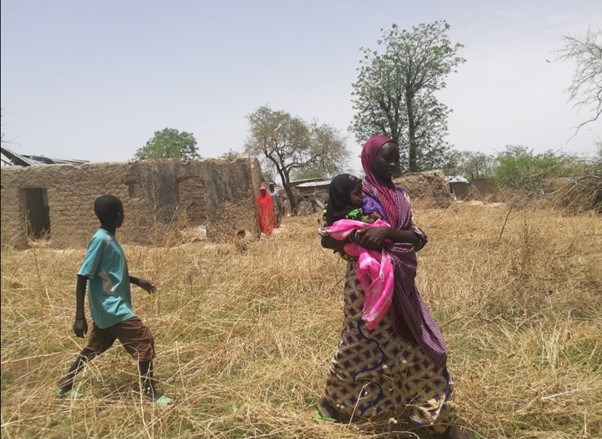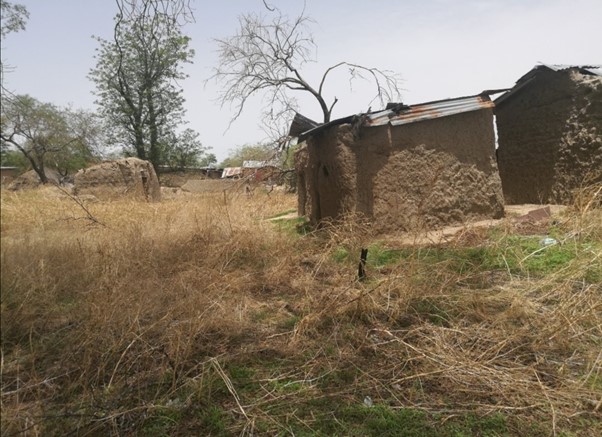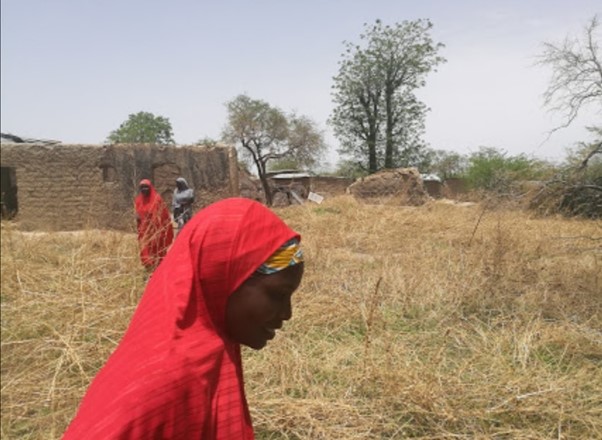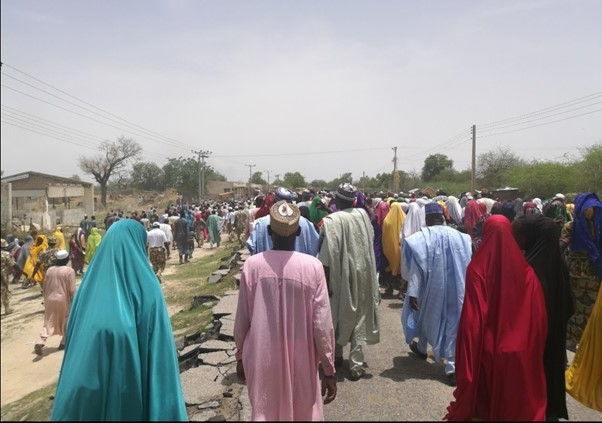Guzamala: Nigeria’s Captured L.G.A. Where Non-State Actors Still Rule
The Nigerian government has repeatedly claimed that no portion of the country is under the total control of terrorists but the dire situation in Guzamala begs to differ. The L.G.A. in Borno State, Northeast Nigeria is under the total control of non-state actors.

There are 774 local government areas in Nigeria. One of them is totally under the control of non-state actors.
Over time, non-state actors, such as Boko Haram or Islamic State West African Province (ISWAP), have occupied several locations across Borno, Adamawa, and Yobe states, referred to as BAY states by humanitarian actors.
Although the Nigerian government has repeatedly claimed that no portion of the country’s landmass is under the total control of the terrorists, there are still locations in Borno state that are either under partial occupation by the insurgents or have been in total control for some years now.
For about three years now, the whole of Guzamala, which covers 2,517 square kilometres, has been under the occupation and control of armed opposition groups.
The Nigeria military fighting to control the insurgency in the fringes of Lake Chad had said that it has dispelled Boko Haram from all parts of Borno state. Despite such claims, the Nigerian and Borno government have not been able to move into Guzamala, due to the worsening insecurity.
Sources familiar with the terrain have said that “even the military are avoiding Gudumbali, the headquarters, like a plagued territory.”
HumAngle can authoritatively report that Guzamala remains the only council area in Borno state which even the most daring governor, Babagana Zulum, has not been able to visit since he assumed office in May 2019. Zulum has so far visited 26 of the 27 local government areas of Borno more than three times, except Guzamala.
Credible sources have confirmed that the entire area of Guzamala Local Government; comprising Zuwa, Gudumbali East, Gudumbali West, Guworam, Guzamala East, Guzamala West, Kingarwa, Mairari, Moduri, and Wamiri are no-go-areas for the Nigerian military.
Sources added that the Boko Haram insurgents have established their full authority in the entire area even as they allegedly hoist their flags in most of the communities.
It is being said that the insurgents now dispense their authority over locals who were trapped within Gudumbali town.
“They (Boko Haram) are the government there in Guzamala because the locals who live there have to take clearance from them to either move out or move into the place,” said a local trader Ba’ana Ibrahim.
“Recently, we heard that they have even dug trenches around Gudumbali, just the way government forces have dug trenches around Maiduguri and other occupied local government headquarters to wade off attacks,” the source added.
According to the 2006 population census, Guzamala has over 95,648 people. Most of this populace are now living in Internally Displaced Persons (IDP) camps in Monguno and Magumeri local government areas of Borno state.

No-go area for government officials
Interestingly, the Speaker of Borno state House of Assembly, Abdulkarim Lawan, is from Guzamala local government area.
Lawan had early this year, in a report published by Premium Times, challenged the claims of the immediate past chief of defence staff, General Gabriel Olonisakin, who said no Nigerian territory was under the occupation of Boko Haram. The speaker belied the army chief, stressing that his entire local government had been under the control of Boko Haram in the last three years.
“I still disagree with the claims of the former Chief of Defense Staff during their pulling out ceremony that no territory in Nigeria is under the control of Boko Haram,” Lawan said.
“I say this because my local government is completely under the control of Boko Haram for the past three years. As I am speaking to you right now, there is no single civilian that lives in the entire territory that defines my local government area, Guzamala. Sadly, there is also no single military presence or soldier in my local government,” he added.
Gudumbali, the headquarters of Guzamala, was the town where 114 soldiers lost their lives in one of the bloodiest battle troops had with insurgents when government forces tried to reclaim the town from Boko Haram in 2015.

It was on record that a battalion of 750 soldiers fought for four days to reclaim Gudumbali, a town 200km from Maiduguri, the state capital. But on day four, while soldiers celebrated their victory, the insurgents attacked from all flanks in a deadly shootout that left 144 of them.
The soldiers and the entire community were completely dislodged as insurgents took over the territory for over two years. In 2018, the army was able to mobilize and dislodge Boko Haram from Guzamala.
The then chief of army staff, Lieutenant General Tukur Buratai led top military officers and Borno state government officials to flag off farming activities to mark the return of civilians to the local government. The former army chief had also inaugurated a cenotaph at the mass grave location where the 144 soldiers were killed and their decomposed bodies buried in shallow graves.
Two months later Boko Haram returned to Gudumbali in September when they staged another deadly attack that sent both soldiers and civilians out of Guzamala local government. To date, no civil authority has returned to Guzamala.
Speaker Lawan told HumAngle that the insurgents had occupied his local government so much that it has been the only council area that even the “fearless Governor Zulum has not been able to visit the 27 local government areas.”
Yet, the Nigerian government has been consistent in its claims that none of the 774 local government areas is under the control of Boko Haram.
In February, shortly after the current service chiefs took over the command of the nation’s military, the ISWAP faction staged a deadly attack on Marte, another border community in northern Borno. The attack led to the death of at least seven soldiers and injured many others.
The new Chief of army staff, General Attahiru, had to visit Maiduguri to vent his displeasure over the Marte attack.
The new COAS, who was once a Commander of the Theater in Borno state, later visited Dikwa, being the closest local government to Marte where he gave a marching order for the troops to reclaim Marte “in 48 hours.” The troops responded by storming Marte days later to retake the fishing community.
The swift reclaiming of Marte had left many wondering why Guzamala, a local government that has been under the control of the insurgent for three years, was not accorded similar gallantry.
Speaking to HumAngle about the situation facing his local constituency, the displaced Speaker of Borno state house of Assembly ventilated his sadness over the claims of the military leaders that all is well in northern Borno.
“For God sake, my local government is completely under the control of Boko Haram for the past three years. As I am speaking to you right now there is no single civilian that lives in the entire territory that defines my local government area, Guzamala. Sadly, there is also no single military presence or soldier in my local government.”
“I have once heard the minister of information; Alhaji Lai Mohammed said the same thing that no single local government area is under the occupation of Boko Haram.”
“I had once told the media during one of the press conferences I granted some months ago that Nigeria is made up of 774 local government areas and my local government, Guzamala is one of them. So if the military and officers of the federal government keep saying that no Nigerian local government is under the control of Boko Haram, it then means that the number of local governments in Nigeria has been reduced to 773, because Guzamala is still under full occupation of Boko Haram. For God sake, my local government, Guzamala is up to date a no-go-area for both military and civilians,” he said.

Chairman of Guzamala local government council, Umar Kyari has confirmed to HumAngle that the local government council secretariat had to move to a makeshift office in the neighbouring Nganzai Local Government Area.
“In 2018, we in Guzamala Local Government Area Jubilated when troops of Operation Last Hold accompanied 6,000 IDPs back to Gudumbali, the Headquarter of Guzamala Local Government. But we couldn’t stay there for long, because Boko haram came back to dislodge the troops and the civil population.”
“Precisely on 20 June 2018, we were forced out of Guzamala and now taking refuge at various camps in the state. Since then, the Guzamala Local Government secretariat and administrative works have been operated temporarily in Nganzai Local Government Area.”
“My people are now in a very difficult situation in IDP camps which was even compounded with the recent fire outbreak that occurred in Nganzai IDPs camp.”
“In that fire incident, at least more than 1,200 people of Guzamala are now homeless with no food or means of livelihoods.”
Guzamala, a local government that is three times the size of Singapore, has been under the full control of non-state actors for the past three years.
Asked recently what the military is doing about Guzamala, the new Chief of Defense Staff, General Lucky Irabor simply said “It’s a work in progress, peace is a work in progress, counter-terrorism is a work in progress. It is not an end state itself, the end state is peace but it’s not the product. So we will keep working on it and at the end of the day every space of land including the Timbus will be controlled by the civil authorities.”
Support Our Journalism
There are millions of ordinary people affected by conflict in Africa whose stories are missing in the mainstream media. HumAngle is determined to tell those challenging and under-reported stories, hoping that the people impacted by these conflicts will find the safety and security they deserve.
To ensure that we continue to provide public service coverage, we have a small favour to ask you. We want you to be part of our journalistic endeavour by contributing a token to us.
Your donation will further promote a robust, free, and independent media.
Donate HereStay Closer To The Stories That Matter




